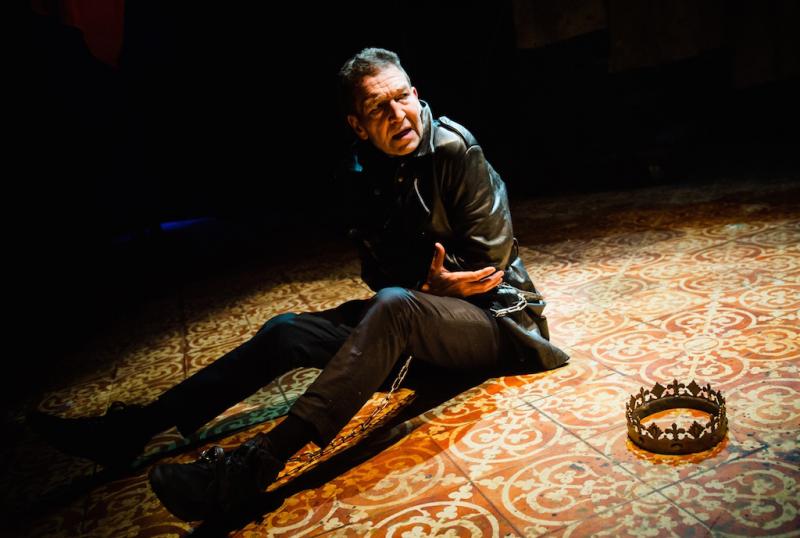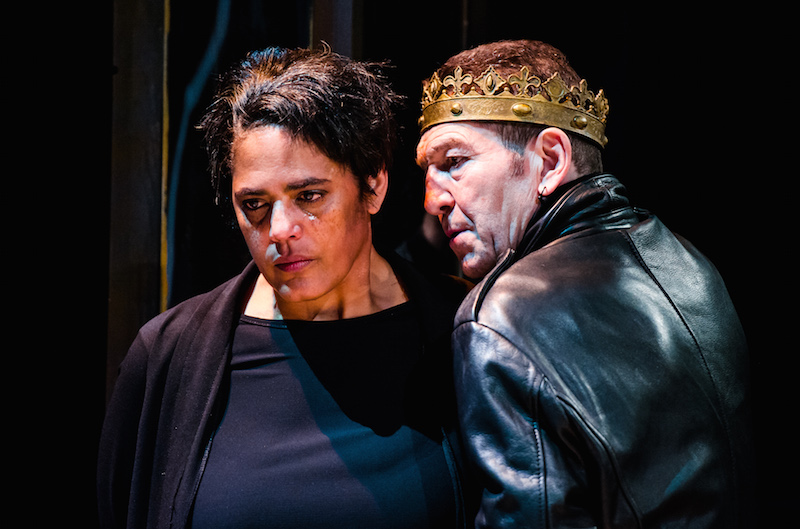Richard III review - Greg Hicks gruesomely impressive as power-crazed ruler | reviews, news & interviews
Richard III review - Greg Hicks gruesomely impressive as power-crazed ruler
Richard III review - Greg Hicks gruesomely impressive as power-crazed ruler
Arch machination and misogyny in its hero lift an otherwise under-nuanced production

There may never have been a time when Shakespeare’s Richard III did not have contemporary relevance, but surely never more than it does right now.
Greg Hicks is a very big talent to find treading the boards of an off-West End theatre, even one with such credentials as the Arcola, and the deep intelligence of his take on Richard comes as no surprise. Resisting any temptation to emulate the bullying charm, or even the smarm, of a familiar 21st century figure, Hicks’s Richard is a shrivelled prune of a man – or perhaps more a dried-up sloe, so bitterly cynical that (unlike Mark Rylance's Richard at The Globe five years ago) he cannot be bothered to feign a pleasant manner, even when he sets his cap at Lady Anne.
The jingling chain that tethers his left wrist to a lame foot gives him the air of a leper
Lanky and lean in skinny black jeans and a leather coat, this Richard has no hump to speak of and his deformity is hardly grotesque. Yet the jingling length of chain that tethers his lifeless left wrist to a lame foot gives him the air of a leper: we repeatedly hear him before we see him. And what we see chimes with the many references to him as a lowly dog.
What’s more, at those moments when Hicks shows us the whirring of Richard’s brain, apparently conceiving even as he utters the words to Queen Elizabeth the repellent idea of marrying her daughter (having just murdered her two young sons), he fingers the chain with nervy excitement, as if fiddling with his penis. It’s quite revolting.
Hicks does subtle things with his voice too, never quite settling on one accent – a touch of the East End mobster here, a touch of his native Leicester there; he often insultingly mimics the intonation of others, including his own mother. It’s a symptom of a human being so amoral that he no longer knows who he is.
 The supporting cast is a touch variable, though some contributions are strong. Among these Sara Powell (pictured above with Hicks) makes a fine job of Elizabeth, a role that can too easily be made unwatchable by grief, and Matthew Sim is a memorably chilling Catesby. Immaculately dressed and inscrutable behind Andy Warhol specs, he has an epicurean’s distaste for dirt and mess, handling the murderous folding penknife he keeps in his pocket as if it were a carefully pressed napkin. On top of all that, it was a nice idea to give him a coke habit.
The supporting cast is a touch variable, though some contributions are strong. Among these Sara Powell (pictured above with Hicks) makes a fine job of Elizabeth, a role that can too easily be made unwatchable by grief, and Matthew Sim is a memorably chilling Catesby. Immaculately dressed and inscrutable behind Andy Warhol specs, he has an epicurean’s distaste for dirt and mess, handling the murderous folding penknife he keeps in his pocket as if it were a carefully pressed napkin. On top of all that, it was a nice idea to give him a coke habit.
The smallness of the Arcola’s playing space – with the audience on three sides – restricts set design to the barest minimum. Nevertheless, designer Anthony Lamble manages to squeeze in a two-storey structure which serves well enough as the dreaded Tower and for the flying of battle standards. Yet beyond a hint of khaki and tent canvas, there is no attempt to suggest the scene on Bosworth Field. In the circumstances it seems entirely apt that this Richard’s demise should come about by means of his own dagger in his own hand, forced on him by Jamie de Courcey’s credibly devout Richmond.
This Richard III is perhaps too plain and sparse to be an ideal introduction either to the history plays or to Shakespeare’s work as a whole. Yet for the playing of its central character and the clarity of verse-speaking across the cast, it is commendable.
more Theatre
 Banging Denmark, Finborough Theatre review - lively but confusing comedy of modern manners
Superb cast deliver Van Badham's anti-incel barbs and feminist wit with gusto
Banging Denmark, Finborough Theatre review - lively but confusing comedy of modern manners
Superb cast deliver Van Badham's anti-incel barbs and feminist wit with gusto
 London Tide, National Theatre review - haunting moody river blues
New play-with-songs version of Dickens’s 'Our Mutual Friend' is a panoramic Victori-noir
London Tide, National Theatre review - haunting moody river blues
New play-with-songs version of Dickens’s 'Our Mutual Friend' is a panoramic Victori-noir
 Machinal, The Old Vic review - note-perfect pity and terror
Sophie Treadwell's 1928 hard hitter gets full musical and choreographic treatment
Machinal, The Old Vic review - note-perfect pity and terror
Sophie Treadwell's 1928 hard hitter gets full musical and choreographic treatment
 An Actor Convalescing in Devon, Hampstead Theatre review - old school actor tells old school stories
Fact emerges skilfully repackaged as fiction in an affecting solo show by Richard Nelson
An Actor Convalescing in Devon, Hampstead Theatre review - old school actor tells old school stories
Fact emerges skilfully repackaged as fiction in an affecting solo show by Richard Nelson
 The Comeuppance, Almeida Theatre review - remembering high-school high jinks
Latest from American penman Branden Jacobs-Jenkins is less than the sum of its parts
The Comeuppance, Almeida Theatre review - remembering high-school high jinks
Latest from American penman Branden Jacobs-Jenkins is less than the sum of its parts
 Richard, My Richard, Theatre Royal Bury St Edmund's review - too much history, not enough drama
Philippa Gregory’s first play tries to exonerate Richard III, with mixed results
Richard, My Richard, Theatre Royal Bury St Edmund's review - too much history, not enough drama
Philippa Gregory’s first play tries to exonerate Richard III, with mixed results
 Player Kings, Noel Coward Theatre review - inventive showcase for a peerless theatrical knight
Ian McKellen's Falstaff thrives in Robert Icke's entertaining remix of the Henry IV plays
Player Kings, Noel Coward Theatre review - inventive showcase for a peerless theatrical knight
Ian McKellen's Falstaff thrives in Robert Icke's entertaining remix of the Henry IV plays
 Cassie and the Lights, Southwark Playhouse review - powerful, affecting, beautifully acted tale of three sisters in care
Heart-rending chronicle of difficult, damaged lives that refuses to provide glib answers
Cassie and the Lights, Southwark Playhouse review - powerful, affecting, beautifully acted tale of three sisters in care
Heart-rending chronicle of difficult, damaged lives that refuses to provide glib answers
 Gunter, Royal Court review - jolly tale of witchcraft and misogyny
A five-women team spell out a feminist message with humour and strong singing
Gunter, Royal Court review - jolly tale of witchcraft and misogyny
A five-women team spell out a feminist message with humour and strong singing
 First Person: actor Paul Jesson on survival, strength, and the healing potential of art
Olivier Award-winner explains how Richard Nelson came to write a solo play for him
First Person: actor Paul Jesson on survival, strength, and the healing potential of art
Olivier Award-winner explains how Richard Nelson came to write a solo play for him
 Underdog: the Other, Other Brontë, National Theatre review - enjoyably comic if caricatured sibling rivalry
Gemma Whelan discovers a mean streak under Charlotte's respectable bonnet
Underdog: the Other, Other Brontë, National Theatre review - enjoyably comic if caricatured sibling rivalry
Gemma Whelan discovers a mean streak under Charlotte's respectable bonnet
 Long Day's Journey Into Night, Wyndham's Theatre review - O'Neill masterwork is once again driven by its Mary
Patricia Clarkson powers the latest iteration of this great, grievous American drama
Long Day's Journey Into Night, Wyndham's Theatre review - O'Neill masterwork is once again driven by its Mary
Patricia Clarkson powers the latest iteration of this great, grievous American drama

Add comment